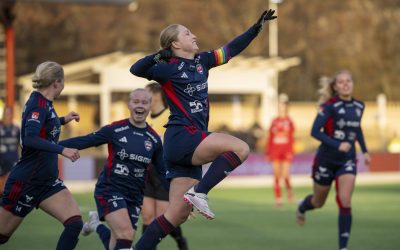Once again, another revolutionary step forward for women’s football comes from Norway. The top women’s league, Toppserien, has announced a new policy for pregnant players. All ten clubs are committed to extending the contract of pregnant players who reach the 12th week of pregnancy before the end of their contract. This will provide much more security for those players. Until now, one of the biggest challenges for pregnant players has been the fear of not finding a new club when they return. Norway has now tackled this problem in an ambitious way. From now on, pregnant players will automatically receive a one-year extension on the same terms as their last contract.
The new rule doesn’t come as a surprise, considering Norway’s progressive regulations outside of football. Parents can take up to 49 weeks of leave with full pay. The European average is only 16 weeks. Marianne Solheim, manager of Norway’s top women’s league, explained the ambition behind the new measure. “It should be safe to become pregnant as a professional footballer in Norway“, she explained. „In a league with a low average age, it is particularly important that young players experience that it is possible to think about both career and family“.
Pregnancy in women’s footbalL: No longer a taboo
Solheim raises an important issue. In women’s football, pregnancy has long been considered taboo and a career killer. Few said it, many thought it: Starting a family would have to wait until after your career. One of the many sacrifices of being a professional football player. For a long time, pregnancy seemed to be the definitive end of a career, especially for top players. Now the tide is turning. Top players like Alex Morgan, Crystal Dunn, Melanie Leupolz and Kristie Mewis have shown that family and career don’t have to be polar opposites.
Pregnant players now benefit from new protections. FIFA introduced a new regulatory framework in 2020 that ensures clubs cannot terminate the contract of pregnant players, must grant them 14 weeks’ paid leave and allow them to choose when to return to play. These regulations are already a massive step forward. The players’ organization FIFPro has long lobbied for such a change, and Germany’s Almuth Schult was involved in drafting their proposals to FIFA.

Still a far way to go for pregnant players
Schult, a top goalkeeper for the German national team and Wolfsburg, was one of the first European players to speak openly about her struggles as a pregnant footballer. The goalkeeper recently ended her career and has struggled to find a club in recent years. Her example shows that football still isn’t ready for playing mothers. “There is still a feeling that clubs trust a player who has been injured more than a player who is coming back from maternity leave,” Schult said recently. The process of returning to football after pregnancy is particularly difficult: Clubs often expect a player to return to full strength just weeks after giving birth, which is simply not realistic.
Another case illustrates the lack of a level playing field for pregnant athletes even better. In 2023, Icelandic international Sara Björk Gunnarsdottir opened up about her struggles after giving birth in 2021. Gunnarsdottir’s club, Olympique Lyon, refused to pay her salary while she was on maternity leave. Gunnarsdottir successfully sued the club and got her money back. But her example shows that when even top clubs like Lyon don’t protect their pregnant players, there is still a long way to go.
Norway makes history in women’s football again
Norway has now shown that progress is possible. This is not the first time the Scandinavian country has led the way for revolutionary changes in women’s football. In 2017, Norway made headlines as the first country to ensure equal pay for the women’s and men’s national teams. The men’s team took a small pay cut to level the playing field for the women’s team. While prize money in tournaments was still far from equal, Norway set a precedent. They inspired countless other teams, most notably the USWNT, in their fight for equal pay. Today, equal pay is still far from a reality everywhere. But Norway’s historic agreement has paved the way for others.
Hopefully, the domino effect will now begin with new protections for pregnant players. Without the guarantee of a new contract, many will still be reluctant to pursue their dream of starting a family. Some clubs have already recognized this problem: last August, AC Milan introduced a similar rule, automatically extending the contracts of pregnant players. Milan was the first European club to implement such a policy, but when an entire league commits to this new protection, the effect is even greater. Norway has led the way. Now it is up to other countries to do the same.
Text: Helene Altgelt



